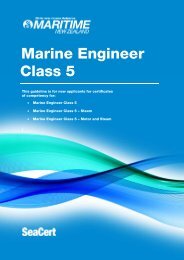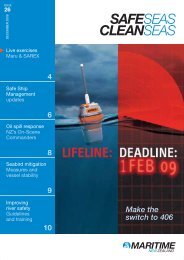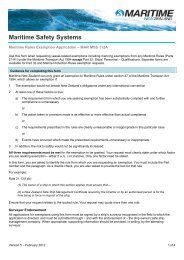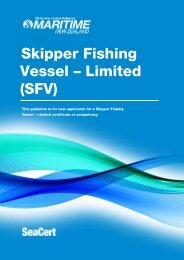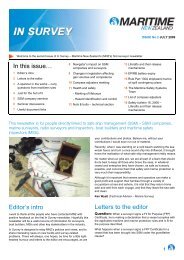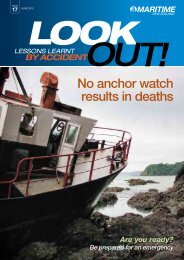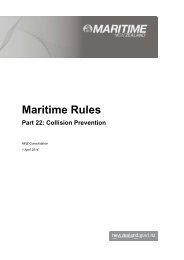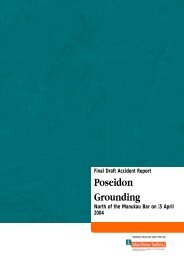Lookout! - Maritime New Zealand
Lookout! - Maritime New Zealand
Lookout! - Maritime New Zealand
You also want an ePaper? Increase the reach of your titles
YUMPU automatically turns print PDFs into web optimized ePapers that Google loves.
Fire sparks<br />
runaway engine<br />
A<br />
tug’s runaway port diesel engine<br />
burned through about 60 litres of its<br />
own pressurised lubricating oil after an<br />
exhaust turbine shaft and seal failed.<br />
Pressurised lube oil was released into the hot<br />
exhaust system. The oil ignited, was forced into<br />
the cylinder heads and caused the engine to<br />
race at very high revolutions.<br />
The crew on board the 20 metre tug saw thick<br />
black smoke coming from the engine room and<br />
flames from the port exhaust stack. Realising<br />
there was a fire, they closed off the stack air<br />
vents and shut off diesel to the port engine, but<br />
it was by now racing uncontrollably on lube oil.<br />
Smoke, heat and fumes blocked the crew from<br />
entering the engine room to set off the CO 2<br />
cylinders. In some situations, runaway engines<br />
can be shut down, but without specially designed<br />
safety controls this can be very risky to attempt.<br />
Realising the fire could not be controlled, the<br />
skipper made a mayday call and gave the order<br />
to abandon ship.<br />
The crew were rescued by Coastguard within<br />
20 minutes, and crew from a nearby Navy vessel<br />
were able to enter the engine room in breathing<br />
apparatus to confirm the fire was under control.<br />
Later the same day, the crew were allowed<br />
back on board and the vessel was able to<br />
return to port on its starboard engine.<br />
Above: The damaged turbine wheel shaft.<br />
Below: The tug’s port exhaust stack was<br />
damaged in the fire.<br />
LOOKOUT!POINTS<br />
• This skipper did the right thing in ordering<br />
the crew to abandon ship, and the crew<br />
were well trained in emergency and fire drills.<br />
• Diesel engine runaway is rare, but any<br />
diesel engine is at risk. The engine races out of<br />
control, consuming its own lubricating oil and<br />
running at ever-higher revolutions per minute<br />
(rpm) until it overspeeds to a point where<br />
it destroys itself, either due to mechanical<br />
failure or seizure. An 1,800 rpm engine can<br />
reach revolutions of 4,000–5,000 rpm.<br />
Common causes are turbo seal leaks, piston<br />
ring leaks, overfilled crankcase oil and leaking<br />
intake valve guides. The more unregulated<br />
fuel entering the combustion chamber, the<br />
greater the risk of a runaway engine.<br />
A diesel engine will burn a wide variety of fuel,<br />
especially when at operating temperature.<br />
It may not be able to be stopped until it has<br />
either exhausted its fuel source and seized,<br />
or torn itself apart. Anyone entering the<br />
engine room is in serious danger from engine<br />
parts such as alternators and belts being<br />
flung out of the plant at high speed. This<br />
engine chewed through about 60 litres of oil<br />
before it stopped.<br />
• Runaway engines are very difficult<br />
to shut off. It may be possible in some<br />
circumstances to seal the air intake,<br />
perhaps with clothing or by an external<br />
mechanism, if fitted. The engine could be<br />
also be starved by discharging a CO 2<br />
fire<br />
extinguisher into the air intake, although this<br />
should not be attempted in the confined<br />
space of an engine room without breathing<br />
apparatus. If this cannot be done, the crew<br />
should abandon ship.<br />
• The best defences against a runaway<br />
engine are regular maintenance and servicing<br />
of turbo chargers and piston rings, a clean<br />
intake system and air filter, regular oil changes,<br />
keeping a log of oil consumption, and<br />
watching for excess smoke in the exhaust.<br />
MARITIME NEW ZEALAND LOOKOUT! JUNE 2011 19






